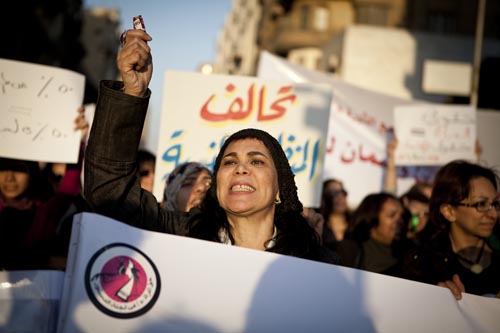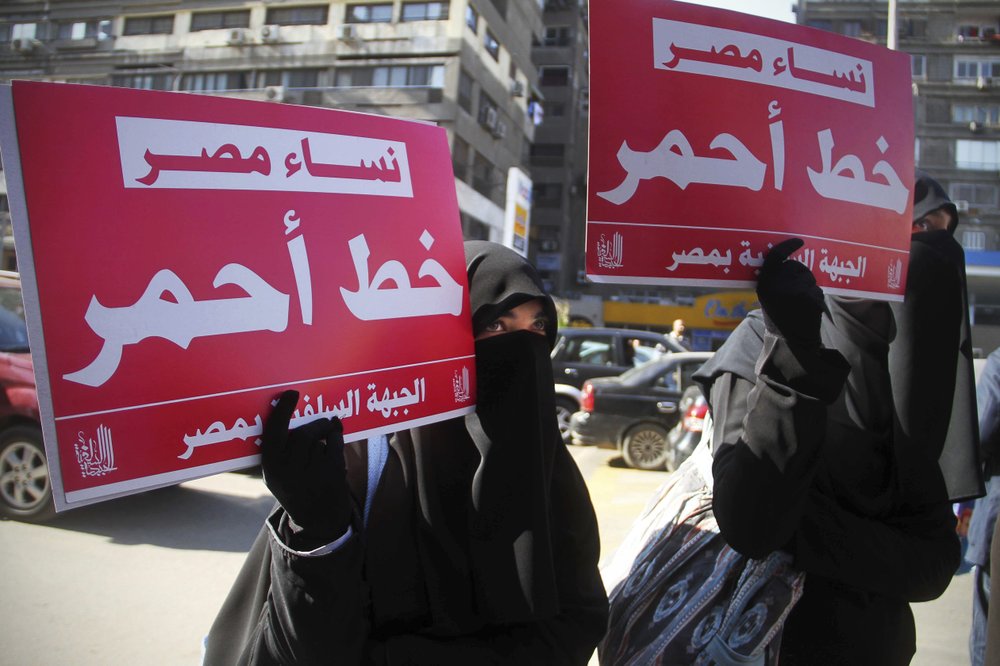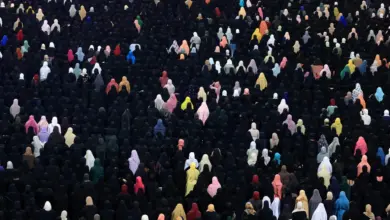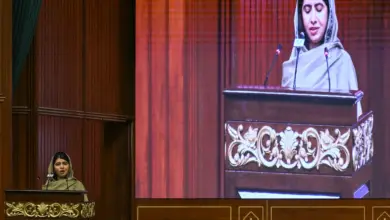
In a transition period dominated by Islamists and where women’s issues are generally dismissed as a trivial concern, many worry that the current women’s movement is not strong enough to counter the perceived dangers on women’s rights.
In a seminar held on Tuesday in the headquarters of the Social Democratic Party under the title “The women’s movement in Egypt: Reality or illusion,” women’s rights researcher and member in the New Woman Foundation Mona Ezzat argued that the women’s rights movement in Egypt lacks the unity and strategic planning that are necessary to form a front capable of countering current threats.
“Women’s organizations need to have a discussion among themselves about their understanding of feminism and accordingly unite their strategy,” says Ezzat, adding that up until now, even though liberal and leftist women’s organizations have been active, they lack the clear vision and strategy necessary to lead a campaign for women’s rights, making their role merely reactionary to current events.
Ezzat adds that women’s participation in the 25 January revolution was considerable but failed to raise any demands concerning women and only stood with the main demands of the revolution.
And since the revolution broke out, many observe ongoing setbacks for women’s rights.
The Egyptian Center for Women’s Rights issued a report for the occasion of International Women’s Day, celebrated annually on 8 March, summing up the challenges that Egyptian women faced throughout the year. The report concluded that, after revolting for their rights, women suffered exclusion from the political scene, severe human rights violations and a campaign against the laws that protect their rights.
“Would it have ever occurred to women that their state after the revolution will be the opposite of what they revolted for? And will Tahrir Square stay synonymous to freedom and equality or will the revolution eat its children, starting with the women?” This question in the report echoes a widely believed idea that the targeting of women as a weak sector of society is the first blow to personal rights in general, which will eventually affect society at large.
According to the report, women were disregarded for most leadership and decision-making positions after the revolution. There have only been one to three women in the governments that have been formed since the revolution, no woman has been appointed governor and there has been weak female representation in important committees, such as the one that discussed constitutional amendments before the referendum in March of last year and the Advisory Council that was formed by the military council, which contains three women out of 30 members.
Women represent approximately one percent of the current Parliament. Activists blame this on the cancellation of the women’s quota law, which guaranteed 64 seats for women in the 2010 elections. The elections law issued ahead of the 2011 poll mandated that each party includes at least one woman on its list, without indicating the women’s place in the list. As a result, most parties placed women at the tail end of the list, making it difficult for them to make it into Parliament.
The report also says that women are excluded from political parties as often as they were before the revolution, and it criticizes most parties for not tackling women’s issues in their programs and only discussing the family and domestic issues.
Women are afraid of a similar exclusion from the constituent assembly that will draft the constitution, which is scheduled to be formed by the end of the month. Fatma Khafaga, a member of the Arab Women Association, outlined the importance of including women in the constitution drafting process and in ensuring equality in the new constitution in a recent article titled “Constitutionalizing Women’s Rights.”
The report also states that the political dominance of Islamists is increasing concern about women’s rights.
Even though they have not explicitly done so yet, Ezzat says that her observation of the Islamist currents in the last year reveals a discourse that aims to exclude women from political life.
Some say that conscious coordination and strategizing from women’s groups is required to improve the situation.
Instead of taking reactionary actions to current events, Ezzat suggests that the women’s movement should create a long-term, comprehensive vision, put forward proposals tackling women’s issues regarding education, work, health and other sectors and ensure the cooperation of state institutions and parties in the realization of these goals.
Ezzat also urges women’s organizations to seek more collaboration and integration in political parties. She says that the alienation of women’s movements from political parties has long minimized the effect of the movements and needs to change.
“A democratic transition is not enough to change the situation of women; there is a cultural reality that needs to be altered,” says Ezzat in response to the belief that when the democratic process is completed, the state of women will automatically improve. Ezzat says that changing the culture should be a part of the strategic plan she calls on women’s movements to adopt.
For others, it is a question of legalizing women’s rights. Khafaga suggests additions to the constitution that criminalize discrimination and set up mechanisms to monitor all governmental and private institutions and ensure that they are upholding standards of equality.
There is an ongoing campaign against laws that women’s rights activists consider the fruit of their work and the work of their predecessors.
Laws including giving women the right to file for divorce, custody laws, criminalizing sexual assaults and aggression against women have all been stigmatized by a perceived relation to the old regime, dubbed “Suzanne’s laws” after the former first lady. These laws are believed by some to have been designed by Suzanne Mubarak to break up Egyptian families.
Mona Zoul Fokkar, a prominent lawyer and women’s rights advocate who was involved in the drafting of many of these laws, says that they were advocated by women’s rights organizations, but the former first lady took credit for them. She says this not an excuse to abolish these advancements in women’s rights, which took years to be achieved.
“We are not ready to see the laws that came as a result of years of work cancelled in a second,” says Omar Ahmed, a member of the Egyptian Women’s Union.
Ahmed says that the movements are now focused on two courses: pressuring Parliament and mobilizing popular support for women’s rights. Ahmed says that the movements will upgrade their strategies gradually if they don’t see a response, starting from statements and ending with sit-ins at Parliament.
On International Women’s Day, women’s movements organized a march and created a list of demands to hand over to Parliament. The demands include a 50 percent representation of women in the constituent assembly, upholding all international traties relating to women’s rights, guaranteeing female participation in politics and protecting the economic and social rights of women that were gained in past years.




